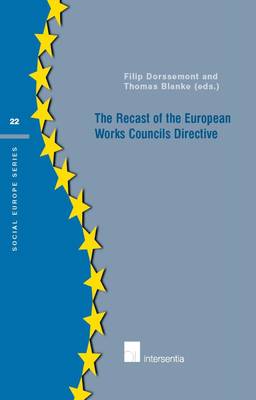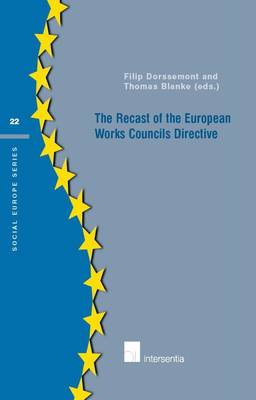
- Afhalen na 1 uur in een winkel met voorraad
- Gratis thuislevering in België vanaf € 30
- Ruim aanbod met 7 miljoen producten
- Afhalen na 1 uur in een winkel met voorraad
- Gratis thuislevering in België vanaf € 30
- Ruim aanbod met 7 miljoen producten
Zoeken
Omschrijving
On May 16, 2009, the EC Directive 2009/38 (Recast Directive) was published in the Official Journal. With effect from June 6, 2011, the EC Directive 94/45 on the establishment of a European Works Council (EWC) or a procedure in Community-scale undertakings and Community-scale groups of undertakings for the purposes of informing and consulting employees will be repealed. It will be substituted by the Recast Directive. This retrospective and prospective book unfolds as a diptych. The first part examines the background and some of the loopholes of the EWC Directive. The background is being studied from a conceptual, historical, legislative, and case law perspective. A substantial part of the first panel of the diptych is dedicated to an analysis of the European Court Justice and domestic case law related to the EWC Directive. This research was operated on the basis of national reports following a questionnaire or format annexed to the book. Both the national reports (Austria, Belgium, France, Germany, the Netherlands, Slovakia, Sweden, and the UK), which have been updated until the end of 2009, as well as a comparative or synthetic report, have been integrated in this publication. The comparative and the national reports have been written as part of a research project of the European Trade Union Institute, which was made possible due to the financial support of the European Community. The second part does not endeavor a systematic analysis of the Recast Directive. It gathers selected essays which have been written by distinguished scholars. Some of the essays have a topical character. They focus on specific improvements of the Recast Directive (the scope ratione temporis, the nature of the recast procedure, the definitions of information and consultation, the issue of continuity, the articulation between European and local information, and consultation procedures).
Specificaties
Betrokkenen
- Auteur(s):
- Uitgeverij:
Inhoud
- Aantal bladzijden:
- 420
- Taal:
- Engels
- Reeks:
- Reeksnummer:
- nr. 22
Eigenschappen
- Productcode (EAN):
- 9789400000759
- Verschijningsdatum:
- 22/06/2010
- Uitvoering:
- Paperback
- Formaat:
- Trade paperback (VS)
- Afmetingen:
- 160 mm x 240 mm
- Gewicht:
- 721 g

Alleen bij Standaard Boekhandel
+ 228 punten op je klantenkaart van Standaard Boekhandel
Beoordelingen
We publiceren alleen reviews die voldoen aan de voorwaarden voor reviews. Bekijk onze voorwaarden voor reviews.











